Vitamin K2 - Directing Calcium & Preventing Arterial Calcification

Today, were going to take a closer look at the dynamic relationship between Vitamin K2 and the robust health of your bones. It might even be the most important vitamin you've never heard of.
What is Vitamin K2 & Why is it important?
Just like vitamins A, D, and E, vitamin K is a fat soluble vitamin, meaning that it is absorbed along with fats in the diet and is stored in the body's fatty tissues for future use. Vitamin K2 is primarily responsible for directing the proper utilization of calcium in the body, guiding it to support bone health and preventing unwanted calcification in arteries and soft tissues (1). An astounding 99% of the body's calcium is concentrated within the bones and teeth, leaving a mere 1% for various physiological functions elsewhere. Vitamin D promotes calcium absorption and then to join forces with Vitamin K2, who guides calcium to the bones, and teeth.
When talking about bone health Vitamin K2 centers around the activation of key proteins called osteocalcin, which are produced by osteoblasts. When vitamin K2 activates osteocalcin, it transforms the protein, enabling it to bind effectively with calcium ions. This binding is pivotal, as it transforms calcium into an indispensable building block within the bone matrix (1).
Its also responsible for preventing calcium accumulation in the wrong places, like arteries and soft tissues. When the build up of fat and cholesterol forms in our arteries we develop something called coronary artery calcification which blocks the flow of blood to the heart. As these calcified plaques obstruct the arteries, the heart may receive insufficient oxygen and nutrients. Researchers found in a recent study, that for every 10 mcg Vitamin K2 (MK-7) consumed the risk of coronary heart disease was reduced by 9 percent.
Menaquinone-7 (MK-7)
Menaquinone-7 (MK-7) is a specific form of vitamin K2, and it differs from other types of vitamin K2, such as menaquinone-4 (MK-4), in terms of its structure and potential benefits. MK-7 often takes the spotlight for several compelling reasons. One notable distinction lies in MK-7's longer side chain, contributing to its extended bioavailability compared to MK-4. This means that MK-7 remains active in the bloodstream for a more extended period, allowing for less frequent intake while still providing sustained benefits for bone health (2).
Additionally, emerging research suggests that MK-7 may confer cardiovascular benefits, particularly in preventing arterial calcification. While MK-4 plays a role in bone health, MK-7's unique characteristics position it as a favorable choice for individuals aiming to optimize their vitamin K2 supplementation. As always, individual needs and preferences should guide the choice, and consulting with a healthcare professional is advisable for personalized advice.
Benefits of Vitamin K2:
Benefits of Vitamin K2:
Strengthens Bones
Vitamin K2 plays a crucial role in bone metabolism, ensuring proper calcium utilization for bone mineralization. Maintaining optimal levels supports bone strength and may reduce the risk of fractures.
Reduces Arterial Calcification
Adequate Vitamin K2 has been associated with cardiovascular benefits, including a potential reduction in arterial calcification. This may contribute to overall heart health by preventing the unwanted deposition of calcium in the arteries.
Enhanced Dental Health
Vitamin K2 supports proper calcium distribution, not only in bones but also in teeth. This may contribute to maintaining dental health and preventing issues like tooth decay.
Inflammation Support
Vitamin K2 plays a role in activating Matrix Gla-Protein (MGP), which helps guide calcium to where it’s needed in the body. By supporting healthy calcium distribution, it may also contribute to a balanced inflammatory response, especially in the cardiovascular system.
Supports Cellular Health
Research suggests that Vitamin K2 may influence cell health by promoting apoptosis, a natural process that leads to programmed cell death, preventing the survival of abnormal or damaged cells. Additionally, Vitamin K2 is thought to play a role in inhibiting excessive cell growth and division. These mechanisms suggest that Vitamin K2 might have a regulatory role in cellular behavior.
Thinking of Trying Ocean Essence?
Ocean Essence provides a healthy balance of bone nourishing minerals and vitamins including Calcium, Magnesium, Vitamin D, and Vitamin K.
What is The Recommended Menaquinone-7 Intake?
The recommended daily intake of Vitamin K2 MK7 varies, but generally, adults can benefit from about 100-200 micrograms per day. This dosage supports bone health and cardiovascular function. However, specific needs may vary based on individual health conditions and dietary patterns. MK7 supplements become particularly important for those who may not get enough from their diet. This includes individuals with dietary restrictions, like vegans or those who avoid high-fat dairy and meats, and older adults who may have difficulty absorbing nutrients. Supplements are also beneficial for people with certain health conditions that affect vitamin K absorption.
Taking MK7 supplements can help maintain strong bones by supporting calcium metabolism and contribute to heart health by preventing arterial calcification. It's always a good idea to consult with a healthcare provider before starting any supplement regimen, especially if you're taking medications like blood thinners, as vitamin K can interact with these drugs.
Identifying Deficiency - Key Signs and Symptoms
Vitamin K2 deficiency can lead to various health complications, primarily impacting blood clotting and bone health. Insufficient levels of Vitamin K2 may increase the risk of excessive bleeding and bruising, as the vitamin is crucial for proper blood coagulation. Moreover, inadequate Vitamin K2 intake can compromise bone strength and density, potentially contributing to conditions like osteoporosis and fractures.
Common Causes Of Deficiency:
1
Poor dietary intake
A diet lacking in Vitamin K2-rich foods such as fermented foods, leafy greens, and certain animal products can lead to deficiency.
2
Gastrointestinal disorders
Conditions affecting the absorption of fat-soluble vitamins, such as celiac disease, Crohn's disease, and liver disorders, can hinder the absorption of Vitamin K2.
3
Antibiotic use
Some antibiotics can disrupt the gut microbiota, affecting Vitamin K2 production by gut bacteria and reducing its availability.
4
Limited fat absorption
Fat malabsorption disorders, such as cystic fibrosis or pancreatic insufficiency, can impair the absorption of fat-soluble vitamins like Vitamin K2.
5
Medications
Certain medications, including blood thinners like warfarin, may interfere with Vitamin K2 metabolism or utilization in the body, increasing the risk of deficiency.
What Are Some Natural Sources of Vitamin K2?
One notable source is natto, a traditional Japanese dish made from fermented soybeans, which is exceptionally high in Menaquinone-7 (MK-7). Dairy products, especially those from grass-fed animals, like certain cheeses (Gouda, Brie) and butter, also contain good amounts. Meat, especially liver and other organ meats, along with egg yolks, provide smaller quantities.
While these natural sources are beneficial, their Vitamin K2 MK7 content can vary based on factors like diet and food preparation methods. MK7 Supplements, on the other hand, offer a consistent and concentrated dose of MK7, making it easier to meet daily requirements. A daily dose of Ocean Essence contains 100 mcg of Vitamin K2, along with Calcium, Magnesium, Vitamin D, Vitamin C, and Boron, and is research-backed to support bone strength, joint health, and digestion. Balancing your diet with these nutrients, along with MK7 supplements, can be an effective way to ensure adequate Vitamin K2 intake.

Get Your Ocean Essence Today
Bones are complex, we make it simple.
Enhancing Bone Health Naturally With Ocean Essence
Enhancing Bone Health Naturally With Ocean Essence
From supporting cardiovascular health to promoting bone strength and aiding in blood clotting, the benefits of Vitamin K2 are diverse and essential. However, achieving optimal levels of Vitamin K2 can pose challenges. Supplements like Ocean Essence offer a convenient solution to bridge the gap between hectic lifestyles and the body's requirements.
Ocean Essence is scientifically formulated to support bone density, joint health, and digestive health using natural ingredients. With a blend of Vitamin K2, Calcium, Magnesium, Vitamin D, Vitamin C, and boron, Ocean Essence provides a comprehensive array of vitamins and minerals, supported by scientific research for their role in supporting bone mineral density.
Incorporating Ocean Essence into your daily routine can help ensure you receive the necessary nutrients to support overall health and well-being, particularly in areas where dietary intake may be insufficient.

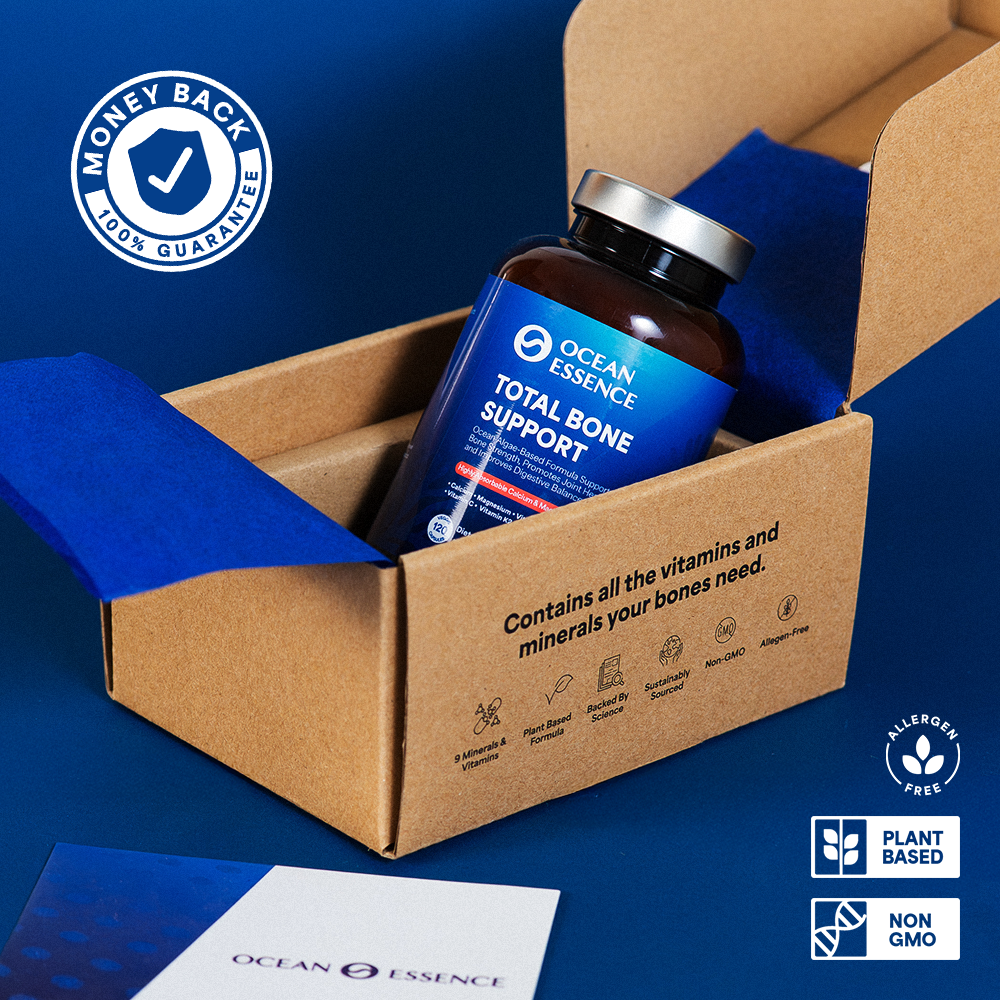

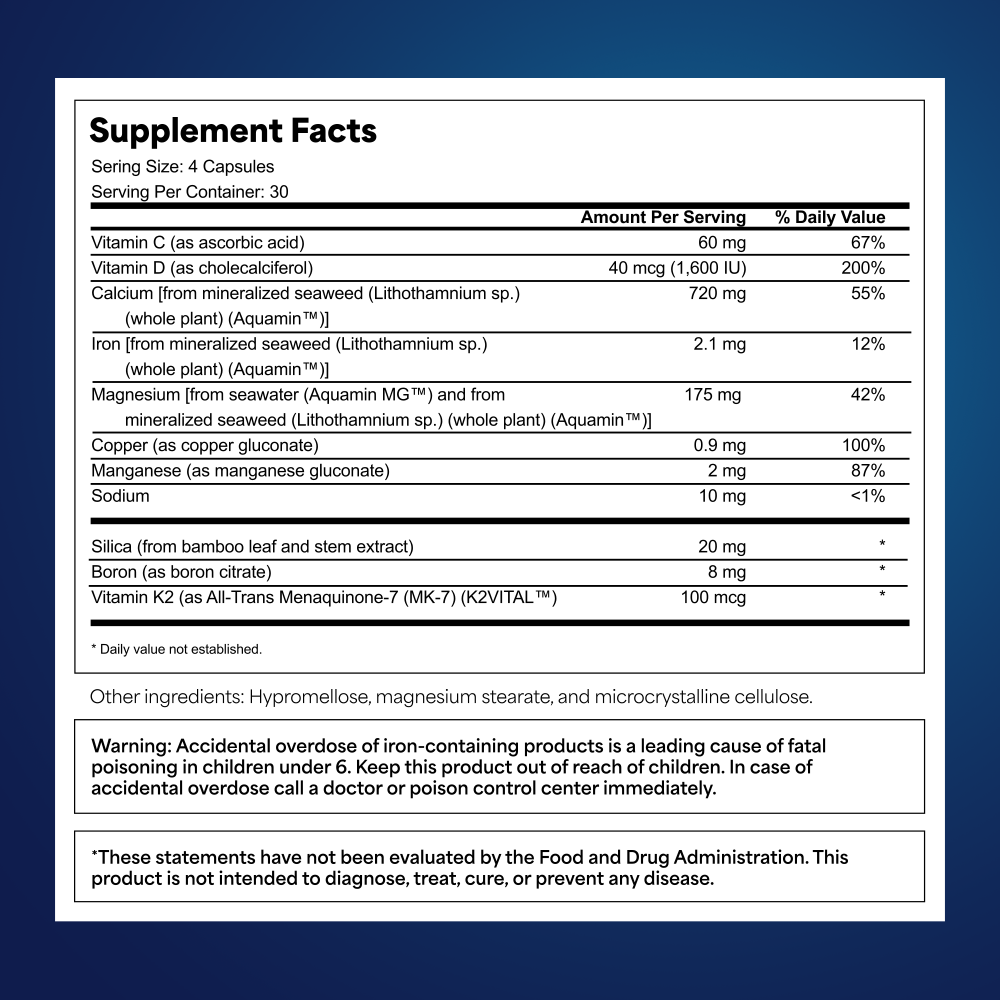
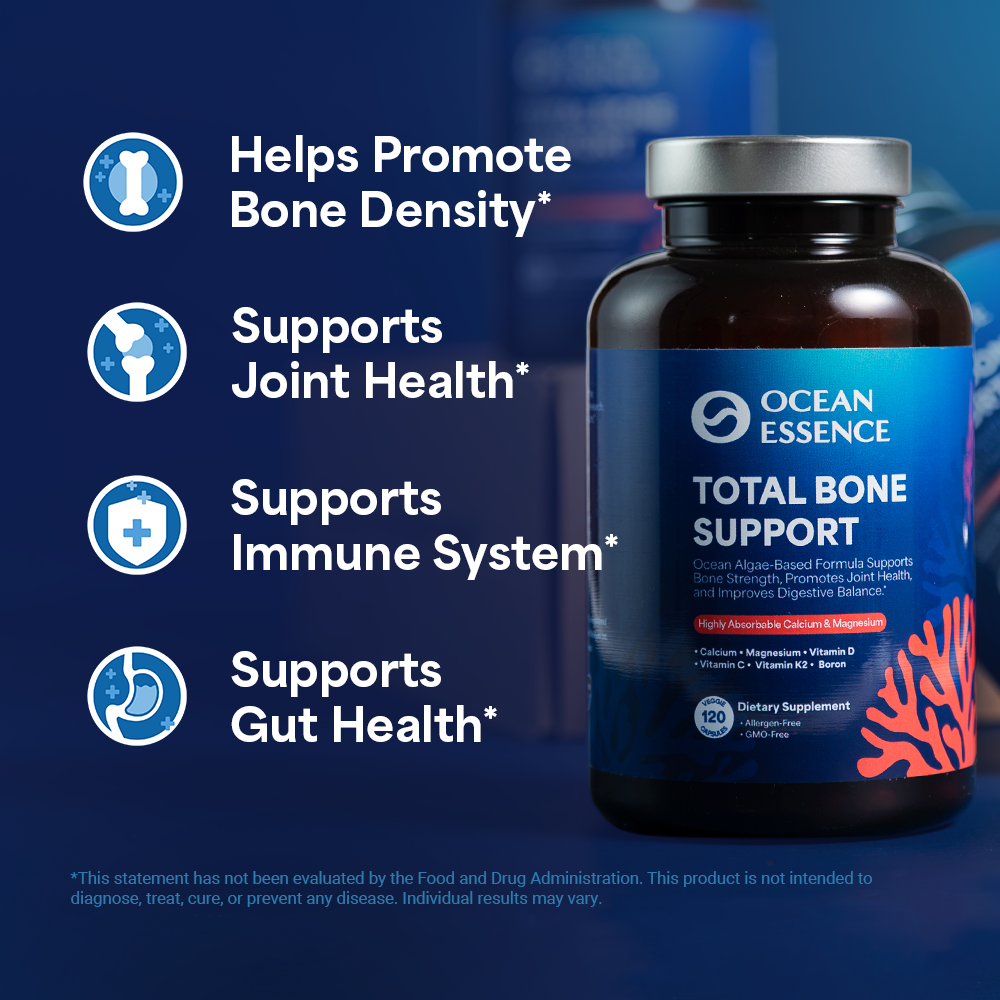
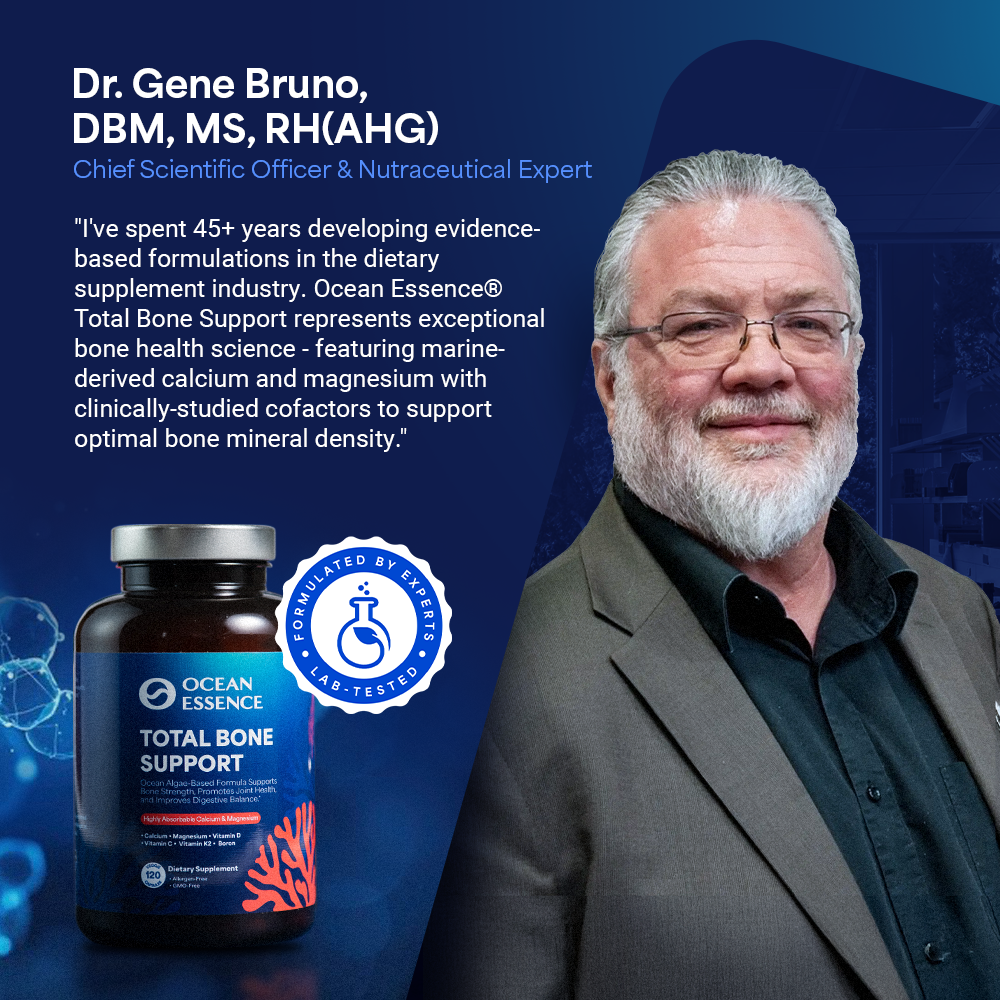
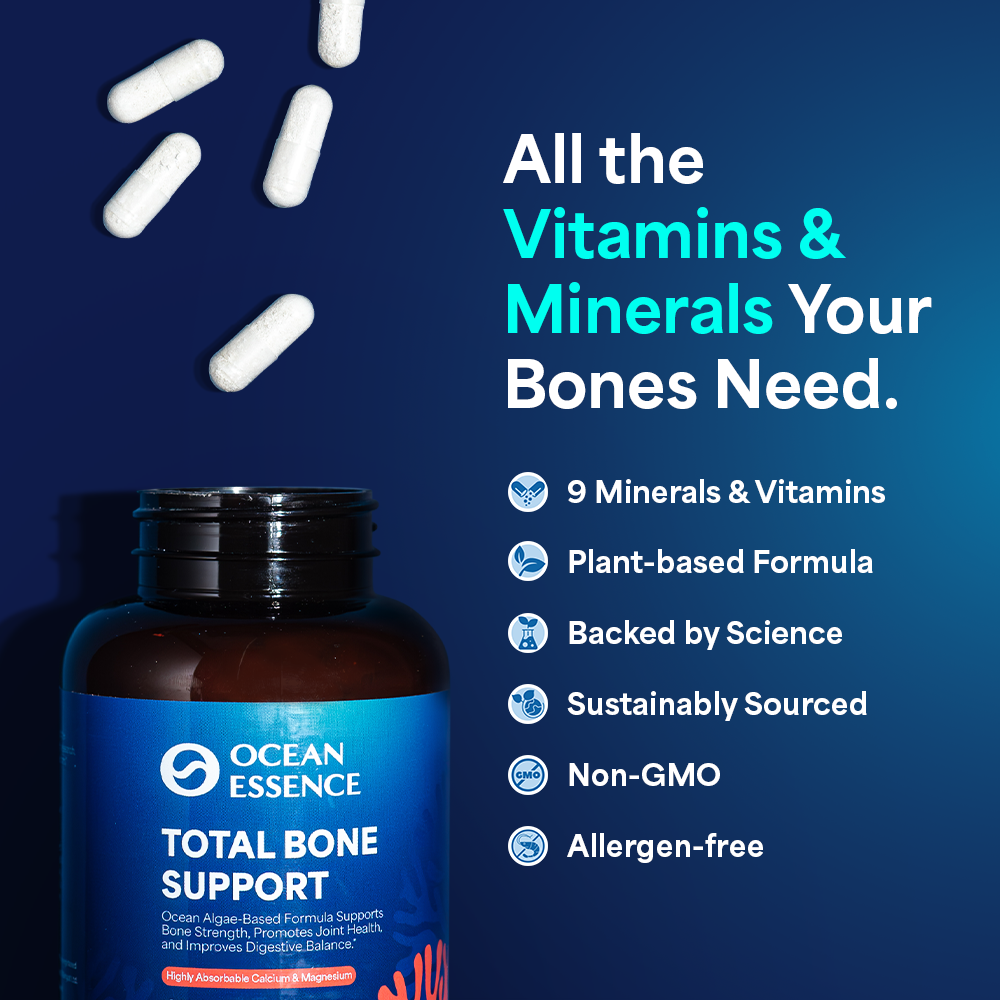
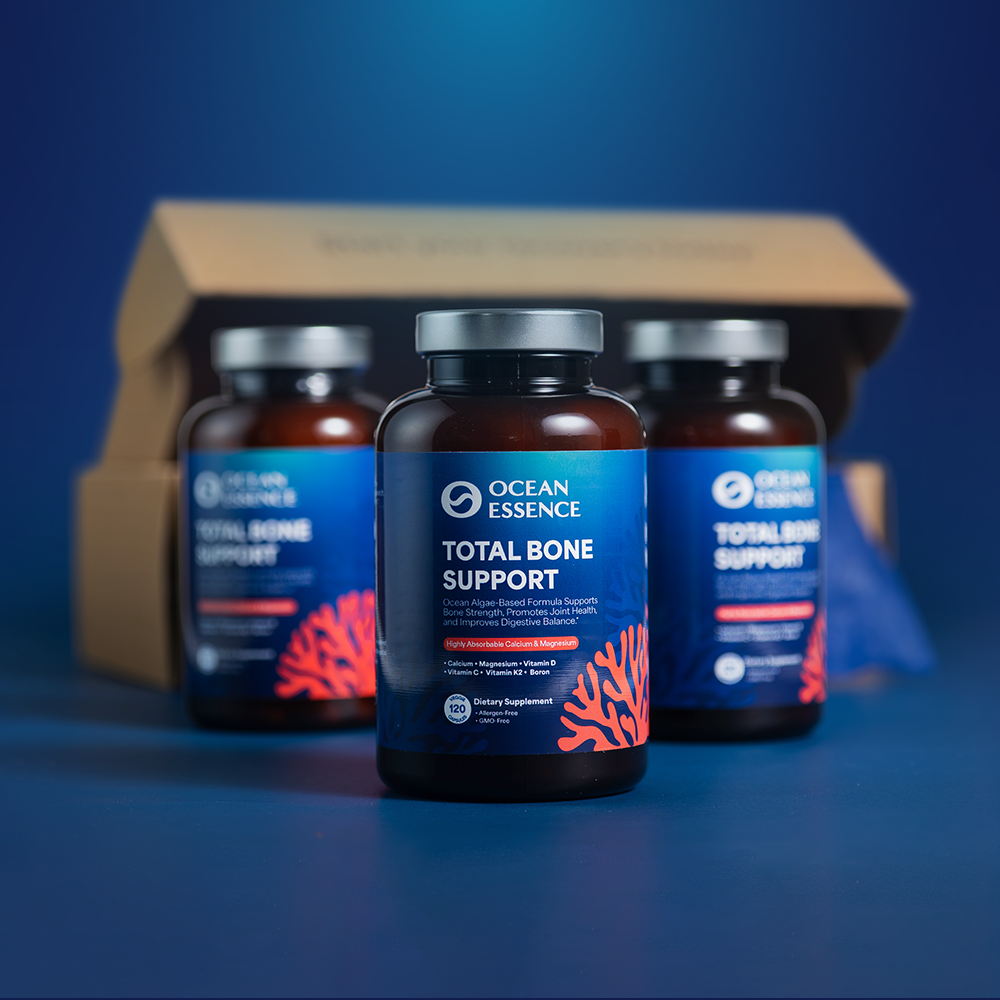
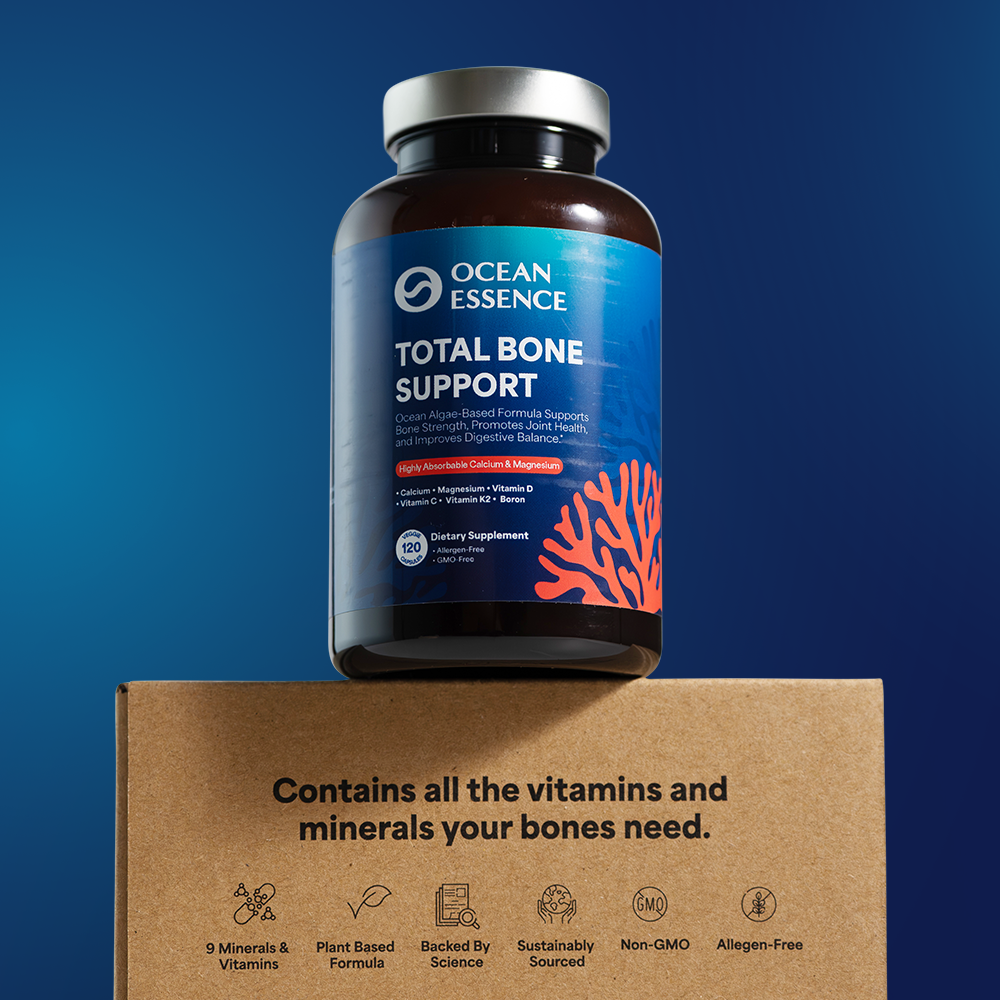
Ocean Essence - Total Bone Support
Support Bone Density*
Ocean Essence - Total Bone Support is an algae-based calcium supplement rich in key vitamins and minerals your bones need. Helps promote bone density.*
Supplement Facts:

Select Frequency:
Subscribe & Save 15%
Amount:
-
-
-
-
Subscription:
365 Day Money-Back Guarantee
Not satisfied? Get a full refund.*

Manufactured In The USA
Crafted in the USA for superior quality and reliability.

2-5 Day Shipping & Delivery With USPS ground
Experience Fast and Reliable Shipping Nationwide
REVIEWS
References:
(1) Maresz, K. (2015). Proper calcium use: Vitamin K2 as a promoter of bone and cardiovascular health. Integrative Medicine (Encinitas, Calif.), 14(1), 34–39. https://www.ncbi.nlm.nih.gov/pmc/articles/PMC4566462/
(2) Vermeer, C. V. (2012). Vitamin K: The effect on health beyond coagulation - an overview. Food & Nutrition Research, 56(1), 5329–6. https://doi.org/10.3402/fnr.v56i0.5329
Adams, J., & Pepping, J. (2005). Vitamin K in the treatment and prevention of osteoporosis and arterial calcification. American Journal of Health-System Pharmacy, 62(15), 1574–1581. https://doi.org/10.2146/ajhp040357

